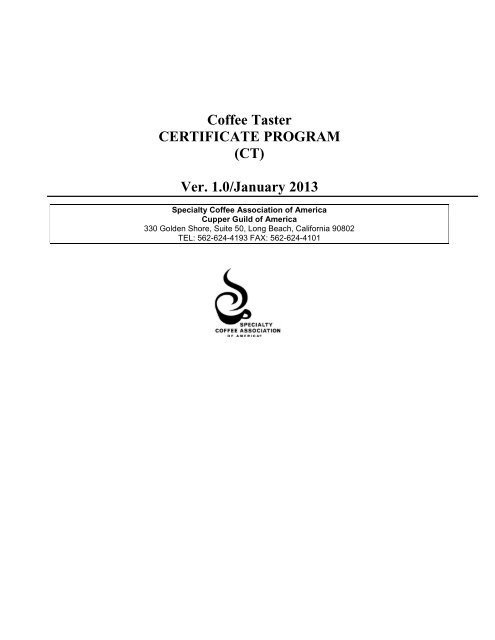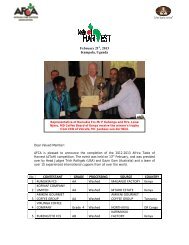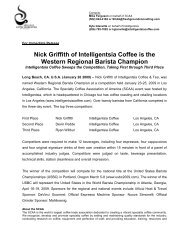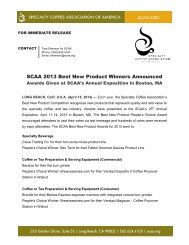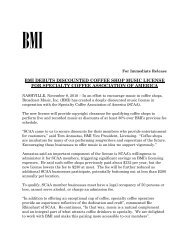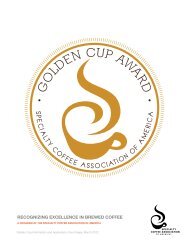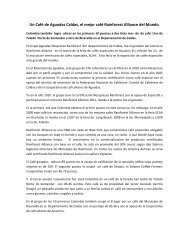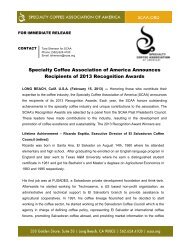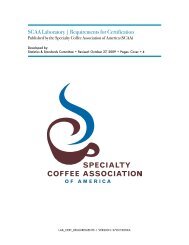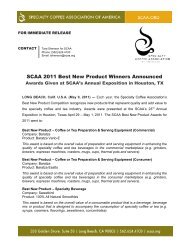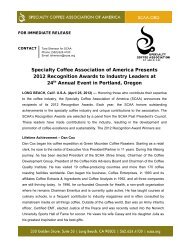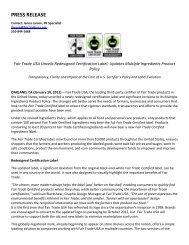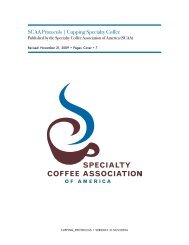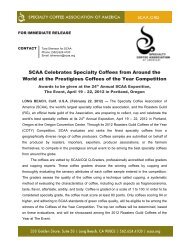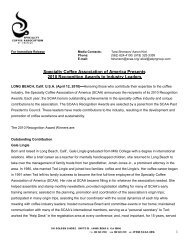Coffee Taster Certificate Program Handbook - SCAA
Coffee Taster Certificate Program Handbook - SCAA
Coffee Taster Certificate Program Handbook - SCAA
Create successful ePaper yourself
Turn your PDF publications into a flip-book with our unique Google optimized e-Paper software.
<strong>Coffee</strong> <strong>Taster</strong><br />
CERTIFICATE PROGRAM<br />
(CT)<br />
Ver. 1.0/January 2013<br />
Specialty <strong>Coffee</strong> Association of America<br />
Cupper Guild of America<br />
330 Golden Shore, Suite 50, Long Beach, California 90802<br />
TEL: 562-624-4193 FAX: 562-624-4101
Introduction to the <strong>Coffee</strong> <strong>Taster</strong> (CT) <strong>Certificate</strong> <strong>Program</strong> Guide<br />
Welcome to the CT <strong>Certificate</strong> <strong>Program</strong> of Specialty <strong>Coffee</strong> Association of America. This guide is to provide<br />
general information to candidates of the program. It contains background information, definitions,<br />
descriptions, and procedures for the program.<br />
TABLE OF CONTENTS<br />
CT INFORMATION: Background ................................................................................................................... 1<br />
CT CERTIFICATE PROGRAM: Overview, Purpose, Eligibility and Requirements .................................... 2<br />
CT CERTIFICATE PROGRAM: Curriculum Summary .................................................................................. 3<br />
MODULE 1 : Overview ..................................................................................................................................... 4<br />
MODULE 1 : Classes, Rationale and Expectations ...................................................................................... 5<br />
MODULE 2 : Overview ..................................................................................................................................... 6<br />
MODULE 2 : Classes, Rationale and Expectations ...................................................................................... 7<br />
MODULE 3 : Overview ..................................................................................................................................... 8<br />
MODULE 3 : Classes, Rationale and Expectations ...................................................................................... 9<br />
MODULE 4 : Overview ................................................................................................................................... 10<br />
MODULE 4 : Classes, Rationale and Expectations .................................................................................... 11<br />
ONLINE CLASSES: Overview, Classes, Expectations and Rationale ..................................................... 12<br />
PROGRAM INFORMATION: Eligibility and Requirements for the Master <strong>Coffee</strong> <strong>Taster</strong> (MCT) ............ 13<br />
EVALUATION AND THE REVIEW PROCESS .............................................................................................. 14<br />
TESTING ......................................................................................................................................................... 15<br />
FEEDBACK AND TEST RETAKES ............................................................................................................... 16<br />
DESIGNATION, RE-CERTIFICATION AND GRANDFATHERING ............................................................... 17<br />
GOVERNANCE and ADMINISTRATION ....................................................................................................... 18<br />
GOVERNANCE: Certification Panel and Chair ........................................................................................... 19<br />
ADMINISTRATION: Instructors, Examiners and Test Administration Guidelines ................................. 20<br />
TEST ADMINISTRATION GUIDELINES ........................................................................................................ 21<br />
CLASS AND TESTING MATERIALS ............................................................................................................. 22<br />
APPEALS PROCESS ..................................................................................................................................... 24<br />
APPENDIX....................................................................................................................................................... 25
CT INFORMATION: Background<br />
Introduction:<br />
Need for the<br />
Certification<br />
The position of <strong>Coffee</strong> <strong>Taster</strong> is critical to the specialty coffee supply chain.<br />
Professional tasters are the first to evaluate green coffee when processing is<br />
complete, the last to approve the production roast, and are called to evaluate final<br />
beverages at the retail level. The specialty coffee industry needs to confirm that<br />
employees in this crucial role have the knowledge and skills required to do the job.<br />
In November of 2012 the <strong>SCAA</strong> conducted an electronic Tasting Analysis Job<br />
Survey. The survey results emphatically confirmed the need for this certification<br />
program. More than 87% of the respondents declared that they perform an official<br />
cupping or taste test weekly, 64% of them daily. Of a list of 29 coffee taster tasks, all<br />
of them were considered important or critical by more than 50% of those surveyed.<br />
The top five tasks were considered critical or important by more than 90% of the<br />
respondents. 50% of respondents positively stated they would use a cupper or taster<br />
certification program if developed by the <strong>SCAA</strong>, while an additional 41% said the<br />
might.<br />
Although there is an existing certification (the Q Graders <strong>Program</strong>) and classes for<br />
developing cupping skills for specialty green coffee evaluation, there has not been a<br />
structured program for advancing the professional career of a coffee taster beyond<br />
green coffee grading. There has been no development of professional tasters as part<br />
of roaster and retail companies’ quality control structure.<br />
The <strong>SCAA</strong> continues to strive for increased global applicability, growing membership<br />
nationally and internationally. Many members of the international coffee community<br />
fit into the category of professional coffee taster – running quality-control labs. The<br />
<strong>SCAA</strong> has realized an opportunity to provide a suitable certification program to meet<br />
their needs.<br />
Responding to<br />
the need<br />
The <strong>SCAA</strong> has created the CT program to fill the gap defined above and strengthen<br />
the industry as a whole by supporting the pivotal profession of coffee taster. This<br />
program is another facet of the <strong>SCAA</strong>’s multi-disciplined approach to supporting the<br />
supply chain, products and processes that make up the specialty coffee industry.<br />
This program will:<br />
Raise the level of core competence and promote continuous improvement<br />
within the profession;<br />
Confirm skill and knowledge levels of tasters by establishing uniform<br />
performance standards;<br />
Provide corollary business and supporting coffee knowledge skill sets to<br />
ensure tasters evaluate the work of farmers and mill workers accurately;<br />
Educate cuppers to communicate appropriately with buyers and roasters<br />
who need to enhance and protect their investments in green coffee; and<br />
Confirm skills and knowledge levels of coffee tasters to perform roasting and<br />
retailing sensory quality control.<br />
Specialty coffee sensory evaluation is a relatively new and evolving category of<br />
sensory science, and the educational curriculum designed by the <strong>SCAA</strong> and its<br />
subject matter experts will allow for protocol adjustments, additional formats,<br />
improved methods for testing tasters and perhaps format integration with others such<br />
as COE & producing countries.<br />
CT Guide Page 1
CT <strong>Certificate</strong> <strong>Program</strong>: Overview, Purpose, Eligibility and Requirements<br />
Overview and<br />
Purpose of the<br />
<strong>Program</strong><br />
The purpose of the CT program is to provide an organized framework of classes and<br />
tests that create opportunity for growth for the working Specialty <strong>Coffee</strong> Sensory<br />
Analyst. The program is designed to appeal and add value to these stakeholders.<br />
Specifically, this program will serve green coffee buyers and sellers, including<br />
producers, exporters, importers, roasting company buyers, as well as quality control<br />
specialist in roasting and retailing companies, and company owners responsible for<br />
hiring of said people.<br />
The <strong>SCAA</strong> is a trade organization. As such, the CT program is intended to meet<br />
the knowledge and skill competencies from a business and commerce<br />
perspective, rather than a university-level sensory analysis or food science<br />
perspective. We aspire to be a bridge either for those with a sensory analysis<br />
and/or food science degree to gain workplace-focused specialization in coffee,<br />
and for CT’s to be equipped for further studies at a university, if they aspire to<br />
broader training.<br />
The program will provide clear educational pathway for specialty coffee industry<br />
members not currently served by existing certifications opportunities. Content and<br />
testing verify a distinguishable skill set needed for <strong>Coffee</strong> <strong>Taster</strong> to support specialty<br />
coffee throughout the chain of specialty coffee distribution.<br />
The goals of the CT are to:<br />
Establish “Specialty <strong>Coffee</strong> Sensory Analyst” as a recognized profession,<br />
conferring credentials at the completion and mastery of each level of the<br />
curriculum.<br />
Provide an organized framework of continuing educational classes and tests<br />
to create opportunity for growth for<br />
o <strong>Taster</strong>s seeking to increase their skills in and knowledge of the<br />
specialty coffee Industry, and<br />
o Employers needing a training program for employees that indicate to<br />
customers a high level of commitment to quality coffee.<br />
Enhance the level of commitment of <strong>Coffee</strong> <strong>Taster</strong> through professionalism,<br />
and interaction with industry leaders and peers.<br />
Meet <strong>SCAA</strong> strategic objectives to<br />
o Develop and promote quality standards;<br />
o Develop and distribute knowledge and skills; and<br />
o Build community.<br />
<strong>Program</strong><br />
Summary,<br />
Eligibility and<br />
Requirements<br />
Classes and tests can be taken anytime at <strong>SCAA</strong> events and applied toward the<br />
certificate. Candidates must pass the written and practical sensory tests test for each<br />
module within 2 years of completing the module.<br />
Entry Requirements:<br />
1. Register in the <strong>SCAA</strong> database<br />
2. Sign Code of Ethics<br />
Recommended:<br />
If a candidate enters the program with little or no experience, knowledge or skills, the<br />
<strong>SCAA</strong> highly recommends that candidates work for at least 6 months as a specialty<br />
coffee taster apprentice.<br />
Required Books & Reading:<br />
<strong>SCAA</strong> <strong>Coffee</strong> Brewing, <strong>Coffee</strong> Cuppers, and Green Arabica Defect <strong>Handbook</strong>s<br />
CT Guide Page 2
CT <strong>Program</strong>: Curriculum Summary<br />
General<br />
Information<br />
Designed by the <strong>SCAA</strong> Professional Development (ProDev) Committee and the<br />
<strong>SCAA</strong>, the classes provide each <strong>Coffee</strong> <strong>Taster</strong> with knowledge and experience in a<br />
logical and accessible program. With collaboration among hundreds of member<br />
companies and individuals who might otherwise consider one another competitors,<br />
class designers identify and support industry best practices. This collaboration<br />
provides a unique strength and credibility to all <strong>SCAA</strong> certification programs.<br />
The <strong>SCAA</strong> awards certificates upon demonstrated mastery of class objectives, verified<br />
through both written and performance exams. The curriculum will evolve as the<br />
industry and technologies advance, creating a continuing education program that<br />
remains contemporary and relevant.<br />
Successful completion of the CT program in its entirety offers assurance by the <strong>SCAA</strong><br />
that the individual has met all criteria established by the CT Certification Panel to<br />
warrant the credential. Typical employment of a certified coffee taster would be a<br />
quality decision making position within a green coffee exporter, importer, broker,<br />
roasting or retail company's quality control team.<br />
Knowledge and<br />
Skill<br />
Competencies<br />
Course Modules<br />
Each class of the CT program has knowledge and performance objectives that<br />
correlate to CT competencies. The CT Certification Panel crafted and/or approved the<br />
competencies at their meetings, the records of which are in <strong>SCAA</strong> files.<br />
The Tasting Analysis Job Survey results showed the complexity and interrelatedness<br />
of tasting in all sectors of the specialty coffee industry. The CT Certification Panel<br />
debated whether or not to have distinct certificate levels. They opted in the end to have<br />
different modules to complete, which together would form a comprehensive group of<br />
competencies that are correlated and representative of the needs of the industry. Each<br />
module is designed to prepare candidates for increasing levels of responsibility in<br />
sensory analysis.<br />
Module 1: The purpose of this module is to lay the foundation of knowledge and skills<br />
of a <strong>Coffee</strong> <strong>Taster</strong> (CT). It contains the basic competencies that must be mastered in<br />
order to receive the CT <strong>Certificate</strong><br />
Module 2: The purpose of this module is to provide the training, experience and tools<br />
for accurately describing how a coffee tastes. Testing is focused on the critical<br />
proficiency of evaluating coffee and espresso with suitable descriptive terms.<br />
Module 3: The purpose of this module is to develop proficiency in coffee roasting for<br />
the purpose of evaluating production roasts. A CT should be able to communicate with<br />
professional coffee roasters, provide feedback and recommend strategies for<br />
improving cup quality.<br />
Module 4: This is the module that professionalizes a CT to a corresponding level as<br />
sensory analysts in other food and beverage fields. Discrimination tests, consumer<br />
testing procedures and issues, and an introduction to the statistics involved in product<br />
testing are part of this module.<br />
Online Classes: Business issues that involve sensory analysis are critical to<br />
profitability. A working knowledge of these issues is another aspect of competency of<br />
a CT. These are lecture-based classes that may be completed at any time in the<br />
program, as long as the candidate has the pre-requisites. Tests are delivered online<br />
after the class.<br />
CT Guide Page 3
MODULE 1 INFORMATION: Overview<br />
Module 1 Summary:<br />
Overview<br />
Module 1 is designed to orient candidates to specialty coffee sensory analysis. The<br />
candidates will learn basic coffee production, extraction and cupping knowledge. By<br />
end of Module 1 candidates will demonstrate their understanding and discipline of<br />
the <strong>SCAA</strong> cupping protocol. All classwork is at the 100 and 200 Levels.<br />
Module 1 is designed to enable CT candidates to:<br />
1. Identify the four primary sensory aspects of brewed coffee.<br />
2. List and explain the six essential elements of brewing.<br />
3. Identify the three main stages of the brewing process.<br />
4. Explain the general rule of optimum extraction and be familiar with the brewing control chart.<br />
5. Distinguish by taste the impact of acceptable vs. improper brewing.<br />
6. Discuss how the coffee extraction process works in these brewing methods: Full Immersion, Pour<br />
Over, Vacuum, Hybrid, and batch brewing devices.<br />
7. Discuss and demonstrate brewing devices within each brewing method and how they can add<br />
value to a business/coffee service.<br />
8. State 3 to 5 historic highlights of how coffee came to be cultivated in the world.<br />
9. List the 3 main species plus several varieties of coffee, as well as where they are commonly<br />
grown;<br />
10. Discuss key factors in nursery practices, fertility and nutrients, weed control and land/site<br />
preparation and shade-grown coffee.<br />
11. Describe basic steps in plant maintenance, including pruning, irrigation, disease control, and<br />
insect control.<br />
12. Describe how coffee is harvested, particularly the differences between selective and mechanical<br />
picking.<br />
13. Describe the key stages in the green coffee process from seed to export raw coffee.<br />
14. Use information on processing to value-add in the workplace in terms of consumer education,<br />
buying decisions, blending considerations and marketing<br />
15. List at least 4 reasons for green coffee grading and describe why each reason is important.<br />
16. Identify and explain key parameters of <strong>SCAA</strong> Green Arabica <strong>Coffee</strong> Classification System and<br />
methods.<br />
17. Practice green coffee defect identification using formal terminology.<br />
18. Use the <strong>SCAA</strong> Green <strong>Coffee</strong> Grading <strong>Handbook</strong> to correctly identify defects.<br />
19. Discuss common testing methods and grading equipment.<br />
20. Recognize the <strong>SCAA</strong> Cupping Form<br />
21. Identify purposes and professional benefits to cupping.<br />
22. Describe the difference and importance of taste and smell.<br />
23. Perform <strong>SCAA</strong> Cupping Protocol and etiquette while cupping with a group completing 3 unique<br />
flights of coffee<br />
24. Use terminology from <strong>SCAA</strong> Flavor Wheel<br />
25. Differentiate between three different roast levels with the same coffee.<br />
26. Differentiate between coffee that has different processing methods (minimum 2)<br />
27. Detect and identify three (3) of four (4) basic taste modalities.<br />
28. Taste three intensities of the three taste modalities, and their intensities when mixed as a blend.<br />
29. Discuss application of the taste modalities, intensities, and mixtures to coffee cupping<br />
CT Guide Page 4
MODULE 1 INFORMATION: Classes, Rationale and Expectations<br />
Ǭ– Indicates classes and tests of equivalency in the CQI system.<br />
CLASS<br />
CP151 Introduction to Brewing and<br />
Extraction, Part 1<br />
CP152 Introduction to Brewing and<br />
Extraction, Part 2<br />
CB100 Seed to Cup or RP206 Basic<br />
<strong>Coffee</strong> Farming<br />
RP207 Basic <strong>Coffee</strong> Processing<br />
GE151 Basics of Green <strong>Coffee</strong><br />
Grading<br />
GE154 Sensory Skills<br />
GE103 Introduction to <strong>Coffee</strong><br />
Cupping<br />
GE190 CT Disciplines Test*<br />
Ǭ<br />
Ǭ<br />
RATIONALE AND EXPECTATIONS<br />
Start with the end in mind: A "proper" cup of coffee is the purpose of a CT’s work.<br />
The essential elements of brewing coffee are the first point of analysis and<br />
evaluation of coffee. Being able to brew coffee to with optimum results using<br />
common extraction methods is the desired outcome. Candidates turn in a<br />
performance checklist, signed by their instructors.<br />
Offered both online and in a classroom setting. These can be substituted with an<br />
approved origin trip. An CT needs to have a good foundation of knowledge about<br />
coffee as an agricultural product and how it is processed. There is no practical test<br />
for these classes, and the learning objectives are tested in the GE190 exam (below).<br />
The classes will be offered online. They must be completed before a candidate can<br />
progress to Module 2.<br />
Accurately evaluating green coffee before it is sample roasted is a key step of<br />
specialty coffee sensory analysis. Candidates are evaluated by grading two coffees<br />
in 30 minutes, including completion of two accurately filled out Arabica Grading<br />
Test Sheets. In addition, candidates turn in a performance checklist, signed by their<br />
instructor.<br />
Sweet, salt and sour are the core tastes. This class is a “gatekeeping” class,<br />
because if participants cannot taste at the most basic level, their success in the<br />
field of sensory analysis will be limited. Therefore, candidates must pass the taste<br />
identification test in order to advance to Module 2 and ultimately receive the CT<br />
<strong>Certificate</strong>.<br />
This foundation class introduces those new to the specialty coffee industry to the<br />
formal <strong>SCAA</strong> protocol of cupping. This class is designed to enable participants to<br />
conduct the processes of cupping to standard. Candidates must turn in one<br />
completed simplified cupping form with 3 coffees evaluated. In addition,<br />
candidates turn in a performance checklist, signed by their instructor. The official<br />
<strong>SCAA</strong> Cupping Form is NOT used in this class, rather the focus is on correct<br />
procedures and etiquette used by the industry.<br />
GE190 tests the practical skills of an CT in terms of standard processes and<br />
protocols. Candidates set up a cupping from start to finish. They must also<br />
correctly perform the <strong>SCAA</strong> Cupping process on one table according to the<br />
protocol. This test includes the final written knowledge test of the 6 classes of<br />
Module 1.<br />
This first installment of the coffee cupping log is to be a checkpoint for candidates<br />
who are new to coffee. Candidates must taste120 different coffees, filling out the<br />
simplified cupping form and coffee info data sheet for each.<br />
GE191 CT Tasting Log*<br />
However, there is a strict timetable that must be followed: The log must be<br />
completed in no LESS than one month and no more than 3 months. This ensures<br />
regular cupping. Candidates must cup at least once a week. Candidates who<br />
cannot adhere to this requirement regularly may appeal in writing to the CT<br />
Certification Panel for a right of exception. If a candidate misses a week or two due<br />
to illness, travel or other reasons, there is a section in the log for their explanation.<br />
The Certification Panel will be reasonable in their judgments and contact<br />
candidates when necessary<br />
* Required for all candidates, no test-out or bypass option.<br />
CT Guide Page 5
MODULE 2 INFORMATION: Overview<br />
Module 2 Summary:<br />
Overview<br />
Module 2 is designed to prepare candidates to participate in a coffee company’s<br />
quality control program. Candidates will develop their descriptive sensorial skills,<br />
gain understanding of espresso tasting, and deepen their skills of using the <strong>SCAA</strong><br />
cupping form.<br />
Module 2 is designed to enable CT candidates to:<br />
1. Recognize thirty-six (36) common aromatic scents often found in coffee’s fragrance, aroma, and<br />
nose used in the Le Nez du Café kit<br />
2. List the four groups into which the scents are categorized: Enzymatic, Sugar Browning, Dry<br />
Distillation, and Aromatic Taints.<br />
3. List 4 commonly occurring organic acids in Arabica coffee and describe their flavors<br />
4. Identify by taste 4 commonly occurring organic acids in coffee<br />
5. Discuss the 4 main sources of acids in coffee, stating what is known and where research is<br />
needed on how coffee production can affect the taste of acids in the beans.<br />
6. Discuss how identification of organic acids can affect buying, roasting, blending, marketing and<br />
other business decisions<br />
7. Explain the categories analyzed by the <strong>SCAA</strong> cupping form<br />
8. Score coffees accurately using the <strong>SCAA</strong> form.<br />
9. Demonstrate <strong>SCAA</strong> protocols and use of <strong>SCAA</strong> Cupping form to calibrate evaluation with others.<br />
10. Show scoring of uniform, clean, and sweet as it relates to the objective for specialty grade.<br />
11. Identify taint and/or fault defects in the cup.<br />
12. Discuss the use of the cupping form at work in terms of consistency, record-keeping and<br />
calibration of staff and peers in the industry.<br />
13. Describe steps and stages of the roasting process, beginning to end (use terms presented in<br />
class for chemical reactions and heat-transfer; tell steps the roaster takes; state stages of bean<br />
development- Enzymatic, Sugar Browning, & Dry Distillation).<br />
14. Discuss the basic effects of time and heat on roast development.<br />
15. Identify and describe common features and controls of standard drum-roasters<br />
16. Use a small batch drum roaster to roast coffee, and evaluate the roasts in a cupping.<br />
17. Recognize common dangers involved in the roasting process and describe preventive measures,<br />
corrective actions and basic safety in a roasting plant.<br />
18. Shut off a roaster after roasting and describe basic daily and regular cleaning and maintenance<br />
requirements<br />
19. Explain the structure and organization of the coffee taster’s flavor wheel<br />
20. Identify and organize aromas into the 9 primary categories defined by the <strong>SCAA</strong> flavor wheel<br />
21. Identify and organize tastes into the 8 primary categories defined by the <strong>SCAA</strong> flavor wheel<br />
22. Practice exercises designed to enhance flavor memory recall<br />
23. Describe coffee accurately using terminology from the flavor wheel<br />
24. Identify features of correct espresso<br />
25. State the <strong>SCAA</strong> definition of espresso and step by step espresso preparation instructions<br />
26. List the four essential elements needed for brewing high quality espresso<br />
27. Discuss and perform basics of dosing, distribution, and tamping<br />
28. Prepare espresso according to the <strong>SCAA</strong> definition using the <strong>SCAA</strong> protocol<br />
29. Heat and texture milk to <strong>SCAA</strong> best practices<br />
30. Identify and prepare and espresso and a traditional cappuccino according to <strong>SCAA</strong> standards<br />
CT Guide Page 6
MODULE 2 INFORMATION: Classes, Rationale and Expectations<br />
Ǭ– Indicates classes and tests of equivalency in the CQI system.<br />
GE153 Le Nez du Café<br />
CLASS<br />
GE255 Organic Acids and the Chemistry of<br />
<strong>Coffee</strong><br />
GE201 The <strong>SCAA</strong> Cupping Form and Peer<br />
Calibration<br />
RP112 Introduction to Roasting Concepts<br />
GE353 <strong>Coffee</strong> <strong>Taster</strong>s Flavor Wheel<br />
CP121 Introduction to Espresso for Roasters<br />
and <strong>Coffee</strong> <strong>Taster</strong>s<br />
GE192 Module 2 Exam*<br />
GE193 CT Cupping Log*<br />
Ǭ<br />
Ǭ<br />
Ǭ<br />
RATIONALE AND EXPECTATIONS<br />
Aromas from the Le Nez Du Café kit for coffee are used as<br />
beginning reference points in the language of sensory analysis.<br />
Candidates must pass an aroma identification test to move into<br />
Module 3.<br />
Identifying the acids in coffee that occur at different stages of<br />
the roasting process is an important area of competence for a<br />
coffee taster. This class will include objective sensory<br />
performance tests of acid identification.<br />
This class is a core class of the <strong>SCAA</strong> and is given all over the<br />
world to universalize the cupping form and its use. Having and<br />
exact language and scoring coffees with the same approach<br />
and guidelines is critical to calibrating cuppers around the<br />
world.<br />
<strong>Coffee</strong> roasting is crucial for an CT to grasp solidly. When<br />
communicating with commercial coffee roasters, it is valuable<br />
to be able to roast coffee satisfactorily and explain roasting<br />
concepts. Candidates complete a performance checklist and<br />
submit cupping results of their class roasts.<br />
This class advances sensory analysis and tests accurate<br />
descriptive language. The <strong>SCAA</strong> <strong>Coffee</strong> <strong>Taster</strong>s Flavor Wheel is<br />
a tool that CTs can actively use at work.<br />
If a CT is called upon to evaluate espresso, being able to<br />
correctly producing an espresso shot is essential. In addition,<br />
this class covers basics of milk steaming, since espresso is often<br />
paired with milk, which produces different sensory<br />
characteristics.<br />
Descriptive analysis practical exam and written exam over the 7<br />
classes<br />
120 different coffees cupped, filling out the <strong>SCAA</strong> Cupping<br />
Form and coffee info data sheet. Must be completed in no LESS<br />
than one month and no more than 3 months. Must cup at least<br />
once a week.<br />
* Required for all candidates, no test-out or bypass option.<br />
CT Guide Page 7
MODULE 3 INFORMATION: Overview<br />
Module 3 Summary:<br />
Overview<br />
Module 3 is designed to prepare candidates to contribute to a coffee company’s<br />
quality control program. The candidates will prove their green coffee cupping and<br />
production roast tasting abilities, as well as deepen their knowledge related to green<br />
coffee trade and roasting.<br />
Module 3 is designed to enable CT candidates to:<br />
1. Differentiate between three coffees of the same producing country with the same processing<br />
method, from different in-country regions<br />
2. Differentiate between three coffees of the same producing country (two flights) that have been<br />
processed using three different methods<br />
3. Characterize washed Arabicas from different regions.<br />
4. Describe the purpose of having a sample roasting program and essential equipment/supplies<br />
needed for an effective program.<br />
5. Distinguish the use of different types of sample roasters (gas, electric, fluid bed, or drum)<br />
6. Roast samples using <strong>SCAA</strong> protocol on a sample roaster, comparing roasted samples to color<br />
tiles.<br />
7. Record information systematically including the cupping evaluation of the roasted samples.<br />
8. Discuss the business case for having a sample roasting protocol.<br />
9. Identify the following defects using Colombian UGQ <strong>Coffee</strong>:<br />
Musty/Earthy<br />
Ferment<br />
Phenolic<br />
Unripe<br />
Faded/Baggy<br />
10. Define and use terminology specific to profile roasting<br />
11. Describe the main variables that must be considered when roasting and how to isolate and record<br />
them to determine roast profile.<br />
12. Record the essential elements of time, heat application and bean and air (if possible) temperature<br />
to create a roast profile.<br />
13. Taste and discuss the impact of changes in heat and time by means of cupping.<br />
14. Discuss possible cause and effect of variables on coffee altered during class and recommend<br />
alterations.<br />
15. Discuss ways of applying the above class practices at work on other equipment and roasters.<br />
16. Describe three physical changes to coffee during roasting<br />
17. Describe the two main browning reactions in coffee during roasting<br />
18. Roast precisely to deliver specific profiles<br />
19. Recognize visual characteristics of basic roast defects<br />
20. Describe sensory characteristics of basic roast defects<br />
21. Plan for roasting technique to avoid defect<br />
22. Identify sensory attributes of brewed coffee related to grind particle size<br />
23. Discuss relationship between extraction rates and brewed solids<br />
24. Calibrate a refractometer and measure total dissolved solids.<br />
25. Evaluate coffee samples using <strong>Coffee</strong> Brewing Control Charts<br />
CT Guide Page 8
MODULE 3 INFORMATION: Classes, Rationale and Expectations<br />
Ǭ– Indicates classes and tests of equivalency in the CQI system.<br />
CLASS<br />
GE202 Comparative Cupping 1<br />
RP223 Sample Roasting<br />
GE204 Defect Cupping<br />
RP120 Profile Roasting Practices<br />
GE216 Defects in Roasting<br />
GE206 Grinding and Particle Size<br />
Analysis [OR] CP158 Golden Cup<br />
Brewing<br />
GE290 Comparative Cupping Practical<br />
and Written Exam*<br />
GE291 CT Cupping and Sample Roasting<br />
Log*<br />
Ǭ<br />
Ǭ<br />
RATIONALE AND EXPECTATIONS<br />
The first set of comparative cuppings are washed Arabicas and<br />
naturals from all regions.<br />
Preparation of coffee samples consistently to standard is a critical<br />
competency to a CT.<br />
Identifying defects in green coffee is a competency that directly<br />
impacts buying decisions. In addition, identifying types of defects<br />
are important in communicating with those in the earlier points of<br />
the seed-to-cup chain<br />
A CT should be able to evaluate the ideal profile for a coffee through<br />
hypothesis, experimentation and tasting/cupping. Communicating<br />
concepts to those in the later points of the seed-to-cup chain<br />
Identifying where things either went wrong or could be improved in<br />
the roasting of a particular coffee is a competency of an CT.<br />
Calibrating brewing equipment and brewing recipes was identified as<br />
a skill that is critical and done often by coffee tasters. Candidates<br />
have a choice between either GE206 or CP158. Both classes involve<br />
the tasting of batch brewed coffee and grinding's effect on flavor.<br />
Candidates more involved in coffee preparation are encouraged to<br />
take CP158, while those in the roasting and coffee evaluation fields<br />
should consider GE206.<br />
This test is the practical exam that tests the cupping of washed<br />
Arabicas and naturals. The written test includes knowledge<br />
objectives from all classes in this unit.<br />
120 different roast profile tastings and/or brewed coffee tastings,<br />
filling out the <strong>SCAA</strong> Cupping Form OR simplified cupping form and<br />
coffee info data sheet. Must be completed in no LESS than one<br />
month and no more than 3 months. Must sample roast or profile<br />
roast and cup or evaluate coffees at least once a week.<br />
* Required for all candidates, no test-out or bypass option.<br />
CT Guide Page 9
MODULE 4 INFORMATION: Overview<br />
Module 4 Summary:<br />
Overview<br />
Module 4 is designed to prepare candidates to make decisions for a coffee<br />
company’s quality control program. The candidates will prove their green coffee<br />
cupping and espresso tasting abilities, as well as deepen their knowledge related to<br />
green coffee trade.<br />
Module 4 is designed to enable CT candidates to:<br />
1. Differentiate between three coffees of Asia with the same processing method.<br />
2. Differentiate between three coffees of Kenya and Ethiopia processed using three different<br />
methods<br />
3. Characterize washed Arabicas from Africa and Asia.<br />
4. State how much caffeine is in regular and decaf coffee, and one way that caffeine can be<br />
measured.<br />
5. List several physiological effects of caffeine on humans<br />
6. Describe in brief at least two historical notes on caffeine or decaffeination.<br />
7. List four decaffeination methods, and describe at least two decaffeination processes accurately<br />
and succinctly.<br />
8. Describe tasting notes on at least 3 different methods of decaffeinated coffee.<br />
9. Determine different purposes and methods for product testing<br />
10. Design and plan steps to conduct sensory testing, using models and tools presented during<br />
class<br />
11. Collect data from sensory testing, identify patterns in preference and product attributes, and<br />
analyze results to guide decision-making<br />
12. Evaluate your organization’s current product testing using terminology and information<br />
presented<br />
13. Differentiate the different cup of three in three different flights of coffee<br />
14. Prepare a triangulation cupping<br />
15. Examine scales and test designs for an A-not-A and a “Just Noticeable Difference” (JND)<br />
discrimination tests.<br />
16. Participate in and gather data from an A-not-A and a JND test.<br />
17. Design an A-not-A and a JND test.<br />
18. Perform profile variations according to varying doses and extraction rates<br />
19. Differentiate and analyze profiles of espressos within one single origin, across regions, roast<br />
profiles, and processing methods<br />
20. Theorize best practices for extraction profiles of various coffees as espresso<br />
21. Synthesize profile results to attempt various blends using available espressos in a classroom<br />
environment<br />
CT Guide Page 10
MODULE 4 INFORMATION: Classes, Rationale and Expectations<br />
Ǭ– Indicates classes and tests of equivalency in the CQI system.<br />
CLASS<br />
GE203 Comparative Cupping Part 2<br />
RP104 (CT version) Decaffeination<br />
GE308 Advanced Sensory Skills: Product<br />
and Consumer Testing<br />
GE303 Advanced Sensory Skills:<br />
Triangulation Cupping<br />
GE304 Advanced Sensory Skills: A-not-A<br />
and Fechner's Law<br />
CP302 Espresso Exploration<br />
GE292 Comparative Cupping Part 2 exam*<br />
GE293 Multi-disciplined Tasting Log*<br />
Ǭ<br />
Ǭ<br />
RATIONALE AND EXPECTATIONS<br />
This class focuses specifically on washed Arabicas and naturals from East<br />
Africa and Asia. Candidates are evaluated by submitting cupping forms<br />
from the class.<br />
The CT version of this class includes a formal cupping of decaffeinated<br />
coffees.<br />
This class provides an overview of the broader field of sensory analysis,<br />
with examples from other industries. A CT will<br />
This is a classic cupping test of the <strong>SCAA</strong> and Q <strong>Program</strong> and<br />
demonstrates essential proficiency in cupping and tasting.<br />
Evaluating production roasts and brewed coffee were two of the needs<br />
expressed by tasters, who completed the CT survey of November, 2012.<br />
Tasting the difference between extraction levels of brewed coffee and<br />
between origins is important and done often. These two product<br />
sensory tests satisfy this competency and can add value to roasting<br />
operations on many levels.<br />
Espresso extraction profiling is a valuable exercise and skill for<br />
developing an espresso blend and/or single origin espresso profiles.<br />
This class is entirely an espresso tasting and evaluation class.<br />
This test includes a practical exam that tests the cupping of washed<br />
Arabicas and naturals, as well as a written test on knowledge objectives<br />
from all classes in this unit.<br />
Candidates must submit logs that record: (1) 30 different espressos<br />
tasted and evaluated, filling out the BGA espresso evaluation form and<br />
coffee info data sheet; (2) 60 different brewed coffees using any of the<br />
cupping or tasting forms from the CT curriculum or an approved<br />
workplace log. Logs may include profile cuppings of different roast<br />
levels of the same coffee, with corresponding profile graphs submitted<br />
as well; (3)<br />
* Required for all candidates, no test-out or bypass option.<br />
CT Guide Page 11
ONLINE CLASSES: Overview, Classes, Expectations and Rationale<br />
Summary:<br />
Overview<br />
Online Classes are designed to prepare candidates to leverage knowledge for a<br />
coffee company’s decision-making. The candidates will deepen their knowledge<br />
related to green coffee trade and field of sensory analysis.<br />
CLASS<br />
CB205 Purchase, Finance, and Green <strong>Coffee</strong><br />
Contracts<br />
Module 1<br />
GE200 Introduction to Sensory Analysis for<br />
<strong>Coffee</strong> Professionals<br />
Module 1<br />
CB206 <strong>Coffee</strong> Market Strategies<br />
Module 2<br />
CB230 Essentials of Supply Chain Management<br />
Module 3<br />
RP219 Economics at Origin: The Cost of<br />
Quality<br />
Module 3<br />
CB310 Statistical Analysis and Record-keeping<br />
for Quality Control<br />
Module 4<br />
RATIONALE AND EXPECTATIONS<br />
CTs must know the language of contracts for purchasing and<br />
filling green coffee contracts. Principles of communication<br />
between participants in the chain are important for coffee<br />
tasters to be aware of, as well.<br />
This 1.5-hour online class is an introduction to the field of<br />
sensory analysis. This class covers purposes of sensory analysis,<br />
such as product matching or reformulation and shelf-life studies.<br />
Participants are also introduced to the physiology and<br />
psychology of the senses: taste, sight, smell, texture and flavor.<br />
Individual differences and bias are touched on in this class, but<br />
covered more in depth in GE304 and GE308.<br />
Issues of the international coffee market have a direct effect on<br />
everyone in the seed-to-cup chain. Having a grasp of basic<br />
concepts is important to factor into and guide decision-making<br />
when coffee must be purchased to fulfill orders.<br />
Managing inventory is critical to profitability of any business.<br />
This class covers the basics and introduces process inventory<br />
control concepts.<br />
Realizing what a farmer is up against in terms of quality helps<br />
build relationships all along the seed-to-cup chain. This class<br />
provides CTs with a language for explaining fluctuations in cup<br />
quality from the same origin or estate from a producer's vantage<br />
point. This class provides deeper understanding of the effects of<br />
climate, agricultural inputs and transportation on green coffee.<br />
This class is designed to help wholesale roasters work with<br />
retailers to develop proprietary blends, and help importers<br />
supply wholesale roasters with coffees of desired green coffee<br />
characteristics. More advanced coffee tasters should be able to<br />
complete statistical analyses of rating scale data, monitoring<br />
sensory panelist performance, designing and analyze<br />
discrimination tests, how to sample serve order designs, product<br />
formulation designs, and methods relating variables. A<br />
background in statistics is NOT required, but GE308 is a prerequisite.<br />
CT Guide Page 12
PROGRAM INFORMATION: Eligibility and Requirements for the<br />
Master <strong>Coffee</strong> <strong>Taster</strong> (MCT)<br />
Summary of <strong>Program</strong><br />
<strong>Program</strong><br />
Summary,<br />
Eligibility and<br />
Requirements:<br />
After much consideration, the <strong>SCAA</strong> <strong>Coffee</strong> <strong>Taster</strong> Certification Panel has decided to<br />
create a panel-elected honorary master level credential. The Master <strong>Coffee</strong> <strong>Taster</strong><br />
(MCT) is an industry-recognized individual qualified to calibrate, train and oversee<br />
CT and specialty coffee quality control programs.<br />
A MCT has career-long employment as a green coffee exporter, importer, broker,<br />
roaster, retailer, producing country quality control program, and/or specialty coffee<br />
training institution where proven mastery of the specialty coffee sensory analysis is<br />
required.<br />
The individual cannot solicit or apply for the credential; rather, the individual must be<br />
nominated by an industry professional with whom the candidate has worked directly.<br />
The CT Panel will review nominations annually and submit approved nominations to<br />
the <strong>SCAA</strong> Board.<br />
To qualify, the MCT candidate must have excelled in the sensory analysis field within<br />
the specialty coffee industry and has demonstrated the following:<br />
1. More than 20 years in a professional sensory analysis career.<br />
2. A leading influence on the development of specialty coffee sensory analysis.<br />
3. Considered by industry professionals as a Master of sensory analysis<br />
4. <strong>SCAA</strong> Board Approval<br />
Nomination<br />
Process<br />
Advocates for the MCT candidate must complete an online form, naming the<br />
candidate and providing initial information. Upon approval to pursue the credential<br />
further, the <strong>SCAA</strong> Education Manager will supply forms for formal submission. No<br />
fewer than five (5) letters of reference and support of the candidate must be<br />
submitted along with the formal application.<br />
The process of approval may take up to six (6) months.<br />
CT Guide Page 13
CT INFORMATION: Evaluation and the Review Process<br />
Evaluation<br />
Tests are given at the completion of each class and grades are posted to the<br />
candidates <strong>SCAA</strong> profile within 30 days of completion.<br />
The CT program uses guidelines set forth by the Joint Committee on Testing<br />
Practices, which can be found on the internet at:<br />
http://www.apa.org/science/jctpweb.html. These guidelines state rights and<br />
responsibilities of test developers, test takers, instructors and administrators.<br />
The following evaluation methods are used:<br />
• Written Tests—multiple choice, matching, fill-in-the-blanks, short<br />
answers, and essay questions<br />
• Performance Exams— skill checklists, work samples, cupping tests,<br />
sensory tests and observation<br />
Classes requiring hands-on learning and/or an observed mastery of the classwork<br />
are presented at <strong>SCAA</strong> events (annual retreat and regional meetings) and/or the<br />
<strong>SCAA</strong> events and have specific skill checklists, which the instructors will use during<br />
class to provide feedback to candidates.<br />
Minimum passing score for the written and practical tests vary, depending on item<br />
content validity. Tests are graded within 2 weeks of administration, and scores are<br />
published on the <strong>SCAA</strong> database within 6 weeks. In order to ensure and receive<br />
timely results, candidates are advised to:<br />
1. Write their names and email addresses clearly on their written test answer<br />
sheet and their performance test booklet.<br />
2. Check that all their information is correct in their online profiles at<br />
www.scaa.org.<br />
Participants can check their status via their online profiles at www.scaa.org.<br />
Those who pass tests receive 2-points credit.<br />
Those who attend class and/or attempt the tests but do not pass one portion<br />
receive 1-point credit.<br />
All scored tests are archived at <strong>SCAA</strong> Headquarters. Candidates may request<br />
feedback under the guidelines listed on page 16 of this handbook within 30 days of<br />
results being emailed or posted. After 30 days no feedback will be given, since the<br />
physical tests will be put into storage and not easily available.<br />
Review Process<br />
for Conferring<br />
Certification<br />
Once a candidate completes the requirements, the <strong>SCAA</strong> Administrator, who<br />
confirms the candidate has met all the requirements, reviews the candidate’s file for<br />
its completion.<br />
The <strong>SCAA</strong> sends certification packets by mail throughout the U.S. For other<br />
countries, certification packets are sent collectively to the host company where<br />
candidates took their tests.<br />
CT Guide Page 14
CT INFORMATION: Testing<br />
Written Tests<br />
Written tests are “closed book”— no materials are allowed in the testing room except<br />
a pencil or pen and specific testing materials (i.e. green coffee handbook). Time<br />
limits on the tests vary by subject and will be stated in the test instructions.<br />
The <strong>SCAA</strong> has created a strict scoring rubric for the written exams to ensure that all<br />
tests are marked reliably and consistently. The CT Certification Panel and <strong>SCAA</strong><br />
ProDev have validated the test and the rubric, ensuring they match class objectives<br />
and <strong>SCAA</strong> standards.<br />
The test rubric is only available to specific <strong>SCAA</strong> ProDev staff and contracted<br />
certified examiners who grade the tests. It is not given to those who administer the<br />
tests. (Integration with Q?) Once candidates complete the written portion of the<br />
exam(s), answer sheets are either mailed to designated <strong>SCAA</strong> staff to mark or<br />
corrected by the contracted instructor.<br />
Performance<br />
Exams<br />
The Grading criteria and scoring rubric for performance exams are not given to<br />
candidates prior to the exam. To prepare for the exam, the <strong>SCAA</strong> recommends<br />
candidates review all protocols described, demonstrated and practices in the classes<br />
of the respective level.<br />
Certified instructors/examiners at sites approved by the <strong>SCAA</strong> conduct performance<br />
exams. Examiners follow a written script and do not give any additional instructions<br />
or information to candidates that are not in the script.<br />
Once the test is complete, the examiner will likely not grade the test. If an <strong>SCAA</strong><br />
ProDev staff member or contracted certified examiner is on site, he or she may<br />
grade the exams and advise candidates of their scores on site.<br />
CT Guide Page 15
CT INFORMATION: Feedback and Test Retakes<br />
Feedback,<br />
counseling and<br />
remediation<br />
The <strong>SCAA</strong> <strong>Coffee</strong> <strong>Taster</strong> Certification Panel has set the following policy for<br />
feedback, counseling and remediation.<br />
Candidates who attended the<br />
complete course module,<br />
attempt the test, and do not<br />
pass the Performance Test:<br />
The <strong>SCAA</strong> ProDev representative will give candidates specific<br />
feedback on what items they missed and contact the examiner, if<br />
necessary. Candidates may request remediation by contacting the<br />
<strong>SCAA</strong> Education Manager and setting up a time for coaching at an<br />
official <strong>SCAA</strong> event.<br />
Candidates who did not attend<br />
the complete CT course (i.e. Q-<br />
graders), attempt the test, and<br />
do not pass the Performance<br />
Test:<br />
Candidates are given very general feedback only. The <strong>SCAA</strong><br />
ProDev representative who gives feedback will recommend the<br />
candidate take <strong>SCAA</strong> classes to prepare for a retake. Only the<br />
following comments will be given:<br />
You did not _____ to <strong>SCAA</strong> protocol.<br />
You did not _____ to <strong>SCAA</strong> standard.<br />
Your _____ was not performed to <strong>SCAA</strong> standard.<br />
Your _____ was incorrect or incomplete.<br />
No specific feedback on points lost or performance items missed<br />
will be given to those who have not taken the complete SCC<br />
course.<br />
Candidates who do not pass<br />
the Written Test (regardless of<br />
class attendance):<br />
As with many testing programs, the <strong>SCAA</strong> will not return tests to<br />
candidates and will not inform candidates of which questions they<br />
missed on written exams. If candidates request feedback, they will<br />
only be told the subject area in which they missed questions.<br />
Re-Taking Tests<br />
Candidates, who do not pass a test are required to retake the test and pass it in<br />
order to receive Certification.<br />
Candidates may retake the exam no less than 3 months from their last test. Only 2<br />
retakes are permitted per year up to 5 years, after which a candidate will need to<br />
retake the relevant classes involved in the un-passed test. Re-take fees will apply.<br />
Those who do not pass the written test should study all the course materials<br />
available at www.scaa.org.<br />
CT Guide Page 16
CT INFORMATION: Designation, Re-Certification and Grandfathering<br />
Designations<br />
Because the program is a performance based certificate, a designation does not<br />
apply. However, the following name-plate may be used by the <strong>Coffee</strong> <strong>Taster</strong>:<br />
(Tara to enter seal here)<br />
Use of<br />
<strong>Certificate</strong><br />
<strong>Coffee</strong> <strong>Taster</strong> <strong>Certificate</strong> holders are entitled to use the <strong>SCAA</strong> logo and seal after<br />
their name.<br />
Example: John Smith, CB2<br />
Re-Certification<br />
& Calibration<br />
Public<br />
Recognition<br />
The CT program awards a certificate upon completion. There is no re-certification<br />
required. However, it is recommended that CT certificate holders attend a <strong>Coffee</strong><br />
<strong>Taster</strong> calibration exam (module 3 or 4 practical exam) every three years. As the CT<br />
<strong>Certificate</strong> becomes more recognized in the workplace, the <strong>SCAA</strong> will recommend<br />
that employers and others verifying references<br />
Those who attain the CT certificate will have their names posted publicly on the<br />
<strong>SCAA</strong> website along with their certification date and, if applicable, the most recently<br />
calibrated date.<br />
Grandfathering<br />
and Honorary<br />
Certification<br />
After much debate, the <strong>SCAA</strong> <strong>Coffee</strong> <strong>Taster</strong> Certification Panel has decided to only<br />
allow Panel-elected Master Level Honorary Certification.<br />
CT Guide Page 17
GOVERNANCE and ADMINISTRATION<br />
Overview<br />
The governance and administration of the certification program are designed to ensure<br />
the integrity and security of the certification program at all levels.<br />
Governance<br />
Structure<br />
The governance of the CTP is the CT Certification Panel. The Certification Panel is<br />
governed by the by-laws of the <strong>SCAA</strong> and thus reports to the <strong>SCAA</strong>. The CT<br />
Certification Panel operates under the legal framework of the Specialty <strong>Coffee</strong><br />
Association of America.<br />
The CT Certification Panel helps provide strategic direction for the program and<br />
represent stakeholders. The CT Certification Panel is chaired by a voluntary panel<br />
member, and consists of at least three volunteer members appointed by the prior<br />
year’s panel in December of each year. Members of the Panel must be members in<br />
good standing of the <strong>SCAA</strong> and actively working in specialty coffee sensory analysis.<br />
The Certification Panel includes two staff members of the <strong>SCAA</strong>, the Director of<br />
Professional Development and the Education Manager. The primary person who<br />
reports activities to the <strong>SCAA</strong> is the <strong>SCAA</strong> Director of Professional Development.<br />
<strong>SCAA</strong><br />
SCSA Cer fica on Panel<br />
<strong>SCAA</strong> Director<br />
Pro-Dev<br />
<strong>SCAA</strong> Educa on<br />
Manager<br />
Voluntary<br />
Chair<br />
Voluntary<br />
Member<br />
Voluntary<br />
Member<br />
Voluntary<br />
Member<br />
Administrative<br />
Staff<br />
The <strong>SCAA</strong> funds the program with staff members whose responsibilities include<br />
support of the CT. The positions are:<br />
Director of Professional Development— Responsible for orchestrating all aspects of<br />
the program. Specifically, the Director of ProDev ensures the program meets the<br />
highest level of quality and integrity of ProDev programs. This includes:<br />
<strong>Program</strong>, Curriculum and class design<br />
Training and coaching instructors and mentors<br />
Ensuring rigor and validity of testing instruments, and<br />
Evaluating the program.<br />
The Director of ProDev is also responsible for supervising <strong>SCAA</strong> administrative staff<br />
who perform record-keeping, information dissemination, and the physical organization<br />
of the program (venues, materials, equipment, etc.). The Director of ProDev<br />
supervises the Education Manager, who works on content and class design.<br />
CT Guide Page 18
GOVERNANCE: Certification Panel and Chair<br />
CT<br />
Certification<br />
Panel<br />
The Certification Panel is made up of two <strong>SCAA</strong> staff members and at least three<br />
voluntary panel members, who are volunteers working full time in the field of specialty<br />
coffee sensory analysis. The main duties of the Certification Panel are:<br />
1. To set requirements for certification, maintenance, and recertification.<br />
2. To oversee the design, development and implementation of curricula and classes.<br />
3. To create and make policy decisions for the program, including requirements,<br />
eligibility, disclosures and candidate rights.<br />
4. To rule on disputes.<br />
5. To establish criteria for evaluating the program.<br />
6. To execute Specialty <strong>Coffee</strong> Tasting surveys.<br />
7. To communicate with the <strong>SCAA</strong> membership concerning the program.<br />
8. To approve CT Specialized Instructors<br />
Panel Chair<br />
The CT Panel Chair is a selected member of the CT Panel who has been a panel member<br />
for at least one year. The Chair ensures that the Panel and its committees operate under<br />
the guidelines of the <strong>SCAA</strong> and work towards the annual goals and objectives established<br />
by the CT Panel.<br />
To be selected as Chair the individual must have a minimum one year experience as a<br />
panel member and be actively working in specialty coffee sensory analysis. The Chair has<br />
an annual commitment from January through December. The <strong>SCAA</strong> Pro-Dev. Director<br />
selects the Chairperson in December of each year.<br />
The chair is responsible to volunteer up-to 20 hours a month and attend at least one<br />
official <strong>SCAA</strong> activity in the year (ex. Conference, Roasters Guild Retreat).<br />
CT Panel<br />
Primary<br />
Responsibilities<br />
The Panel’s core responsibility is to create and maintain a certification program that<br />
accurately reflects the needs of the specialty coffee community, and all of the program’s<br />
stakeholders. The Panel revises the program according to the changing needs of the<br />
coffee preparation profession and coffee industry.<br />
Voluntary members commit to the panel on an annual basis January-December of each<br />
year. Members volunteer up to 10 hours per month, including bi-monthly phone meetings.<br />
They must attend at least one official <strong>SCAA</strong> activity in the year (ex. Conference, Roasters<br />
Guild Retreat). Panel members who fail to meet two consecutive commitments (meetings<br />
or agreed tasks) will be ask to step down from the Panel by the Panel Chair.<br />
The Panel works to:<br />
Execute Specialty <strong>Coffee</strong> Tasting surveys<br />
Establish criteria for the certification designation<br />
Set standards of knowledge and performance for the different subjects covered at different<br />
levels and how the standards are demonstrated in the certification process<br />
Decide on test administration and set passing scores<br />
Construct the judging process of candidates and identify qualified individuals to train<br />
Create timelines and schedules<br />
Design an appeals process for hearing candidate complaints or disputes about<br />
testing/assessment and methods for demonstrating competency in performance and<br />
knowledge standards; handling appeals<br />
Determine criteria for any possible exemptions and/or substitutions in which candidates will<br />
be relieved from meeting a requirement<br />
Monitor the scope of certification and a designation is used by individuals and other<br />
stakeholders.<br />
CT Guide Page 19
ADMINISTRATION: Instructors, Examiners and Test Administration Guidelines<br />
CT Instructors<br />
Credential and<br />
Certification<br />
The CT program uses the <strong>SCAA</strong> Instructor Development <strong>Program</strong> to qualify its<br />
Lead and Specialized Instructors. The level of instructor qualifications varies<br />
depending on the course level and content.<br />
<br />
<br />
100 level courses: Current credentialed <strong>SCAA</strong> Lead Instructors who are<br />
approved by the Director of Professional Development to teach the<br />
particular class may teach 100 level courses.<br />
200 and 300 level courses: Current credentialed CT Specialized Instructors<br />
who are approved by the Director of Professional Development to teach the<br />
particular class may teach 200 & 300 level courses.<br />
Requirements for<br />
CT Specialized<br />
Instructors<br />
Credentials<br />
<strong>Coffee</strong> <strong>Taster</strong>Specialized Instructor Requirements<br />
1. Completing all requirements for <strong>SCAA</strong> Lead Instructor (above)<br />
2. Completing SME requirements in subject area:<br />
a. Q-Grader (until December 31, 2013)<br />
b. <strong>SCAA</strong> CT Module 1 and 2 and Q-Grader (between December<br />
31, 2013 and December 31, 2014)<br />
c. CT <strong>Certificate</strong> (earned by December 31, 2014)<br />
3. Completing advanced <strong>SCAA</strong> Instructor Modules (CB491 and beyond)<br />
4. Instructing 4 classes at <strong>SCAA</strong> events with successful peer reviews<br />
5. Providing 2 references which verify teaching/training on the job of at<br />
least two years<br />
6. Approval by CT Certification Panel<br />
CT Examiner<br />
Credential and<br />
Certification<br />
The <strong>SCAA</strong> <strong>Coffee</strong> TastingExaminer Credential and Certification program<br />
certifies specialized instructors who administer the various levels of written and<br />
performance CT Certification tests.<br />
Any participant in the program must be a <strong>SCAA</strong> member in good standing and<br />
must have previously passed the CT certification tests. All participants must<br />
have also successfully completed the CT Specialized Instructor Credentials.<br />
Start up exception will be made during the first two years of the program (2013<br />
& 14). The CT Panel and/or Director of Professional Development will appoint a<br />
group of initial instructors it deems have the prerequisites to execute the four<br />
module exams.<br />
Requirements for<br />
CT Examiner<br />
Credentials<br />
Requirements for Examiners must be met in the following order:<br />
1. CT Credentialed Specialized Instructor<br />
2. Experience teaching each of the class modules at least twice as a<br />
station instructor.<br />
3. Successful completion of Examiner Training, which consists of up to 8<br />
hours of classroom instruction of rules, guidelines and review of each<br />
item on the performance test and two mock cupping exams.<br />
CT Guide Page 20
CT INFORMATION: Test Administration Guidelines<br />
Test<br />
Administration<br />
Guidelines<br />
Upon successful completion of the <strong>SCAA</strong> Examiner Credential, examiners may<br />
administer the CT Certification tests with the following guidelines:<br />
1. Examiners may not serve as the Credentialed Examiner of the following:<br />
• Members of the examiner’s company;<br />
• A primary customer of the examiner’s company;<br />
• A company in which the examiner has a financial interest;<br />
• A wholesale supplier with which the examiner or his/her<br />
company works;<br />
• Any party with which the examiner anticipates a consulting<br />
arrangement.<br />
2. First Exams and Re-Takes may be scheduled with the following requirements:<br />
• There must be 1 (one) certified examiner to deliver the test, with official<br />
observation by 1(one) additional credentialed examiner. The observing<br />
examiner may be present remotely.<br />
3. Registration for <strong>SCAA</strong> <strong>Certificate</strong> must be handled by <strong>SCAA</strong> in order to count<br />
towards certification status.<br />
• If the event is not set up in the <strong>SCAA</strong> database, candidates will NOT be in the<br />
<strong>SCAA</strong> system and they will NOT get credit.<br />
• Registration for participants will be available online via the <strong>SCAA</strong> website.<br />
• Examiners must notify <strong>SCAA</strong> staff of upcoming certification events a minimum<br />
of 4 weeks before the event by e-mailing: notifications@scaa.org<br />
• <strong>SCAA</strong> Membership staff will advise how to coordinate the event with <strong>SCAA</strong><br />
staff.<br />
• Setup requests MUST be made online at:<br />
https://specialtycoffee.wufoo.com/forms/event-registration-setup-request-form/<br />
• Examiners must present the following information:<br />
Name, E-mail and phone number of Examiner<br />
Location, dates and times of exam<br />
4. All completed written and practical tests must be mailed to the <strong>SCAA</strong> at the<br />
following address no later than 5 business days after the exam:<br />
Specialty <strong>Coffee</strong> Association of America<br />
Attn: <strong>SCAA</strong> Certification Exam Processing<br />
330 Golden Shore, Suite 50<br />
Long Beach, CA 90802<br />
5. CT credentialed examiners will receive a specific sum (check for most recent)<br />
per registered participant to help cover costs in administering the exams paid by<br />
the <strong>SCAA</strong> upon successful completion of the exam and submission of written<br />
and practical tests to the <strong>SCAA</strong>.<br />
6. CT credentialed examiners may also receive full reimbursement of their travel<br />
costs by sponsoring companies wishing to have an examiner offer certification at<br />
their facility. This must be negotiated solely between the credential examiner<br />
and the host of the event. <strong>SCAA</strong> will assume no liability and will play no role in<br />
pursuing reimbursement of travel expenses.<br />
7. The <strong>SCAA</strong> will grade all exams and notify all event attendees if they have<br />
successfully passed the exam. Due to this being a certification event, attendees<br />
will only be told if they have passed or failed the exam with no further information<br />
given.<br />
8. CT Examiners may not give exam participants any feedback on the status of<br />
their exam during or at the completion of the exam.<br />
CT Guide Page 21
CT INFORMATION: Class and Testing Materials<br />
Testing<br />
materials for<br />
classes:<br />
List equipment and supplies here.<br />
CT Guide Page 22
ADMINISTRATION: Confidentiality, Exemptions and Dispute Resolution<br />
Confidentiality<br />
Retaining candidate privacy is a priority to protect the reliability of the program<br />
and prevent the misuse of information about candidates and certificants. The<br />
following procedures are in place to retain candidate privacy:<br />
All CT Panel members, staff, instructors, volunteers, jurors and examiners<br />
sign a confidentiality agreement which states that they will not discuss a<br />
candidate’s work or test scores with anyone unless during an official review<br />
process. Any violation of this confidentiality agreement will be dealt with by<br />
the CT Chair and other Panel members.<br />
All candidate files and records remain locked in the <strong>SCAA</strong> headquarters and<br />
storage facilities. The only people authorized to view candidate files are staff<br />
members related to the program and the <strong>SCAA</strong> Certification Panel. Any data<br />
kept electronically is password protected with only <strong>SCAA</strong> staff members able<br />
to access it.<br />
If outside requests are made regarding a candidate, the only disclosure given<br />
will be whether or not a candidate or certificant is currently in good standing.<br />
Disclosure will not be given which may violate the confidentiality rights of<br />
candidates or certificants.<br />
Exemptions Due to<br />
Illness or Personal<br />
Problems<br />
Candidates are expected to complete the program within a 5 year period. If<br />
you are unable to complete the process due to illness or personal problems,<br />
you may file for an exemption. In the event that a certificant’s status as<br />
working <strong>Coffee</strong> <strong>Taster</strong> has changed, candidates should write to the CT<br />
Certification Panel to discuss the policy for continuing in the program. The<br />
Certification Panel will make every effort to work with a candidate to resolve<br />
concerns fairly and appropriately.<br />
Please follow the procedures for Dispute resolution outlined on the next page.<br />
CT Guide Page 23
CT INFORMATION: Appeals Process<br />
Appeals Process<br />
<strong>Program</strong> participants may appeal scores, rules or requirements in writing.<br />
Because the appeals go to the CT Certification Panel directly, it may take<br />
from 4 to 8 weeks to rule on the appeal, depending on the impact and details<br />
surrounding the appeal.<br />
The following information should be included when submitting your<br />
information in writing by email or mail:<br />
1. Your full name, address, email and telephone number<br />
2. If applicable, what date and place your class or test took place<br />
3. Any instructor, staff member or volunteer involved in the dispute<br />
4. A complete description of your exemption request or concern<br />
5. How you would like to see the problem resolved.<br />
If your concern cannot be immediately resolved, the person to whom you<br />
write upon receipt of your information will give you an estimated time frame<br />
that you will receive an answer. After investigating, the outcome will be<br />
forwarded to you in writing.<br />
In the event that the process does not result in a decision which satisfies you,<br />
you may appeal again in writing to the person you believe could resolve the<br />
issue more satisfactorily. Every attempt to further investigate your claim and<br />
resolve the issue will be made.<br />
Dispute Resolution<br />
Whenever possible, candidates are encouraged to resolve any concerns or<br />
disputes first by phone or email with an <strong>SCAA</strong> staff member on the <strong>SCAA</strong><br />
Certification Panel.<br />
If a candidate is unable to satisfactorily settle the issue, then other avenues<br />
are available. The contact chain is as follows (names and contact information<br />
for people in these positions can be found on the <strong>SCAA</strong> website at<br />
www.Cuppersguild.org):<br />
1. <strong>SCAA</strong> Staff Administrator<br />
2. <strong>SCAA</strong> Education Manager or <strong>SCAA</strong> Staff Liaison<br />
3. <strong>SCAA</strong> Director of Professional Development<br />
4. <strong>SCAA</strong> <strong>Coffee</strong> <strong>Taster</strong> Certification Panel Chair<br />
Please be advised that disputes may take 4 to 6 weeks to find resolution<br />
CT Guide Page 24
APPENDIX<br />
Number<br />
CB100<br />
Class<br />
Number &<br />
Title<br />
CB100 Seed<br />
to<br />
Roaster/Seed<br />
to Cup<br />
Webinar<br />
MODULE 1:<br />
Description<br />
A fundamental skill of any specialty coffee professional is<br />
to be able to identify key points and explain the journey<br />
coffee from seed to cup. The class surveys the custody<br />
of coffee, from farmer to barista. It is a required class for<br />
the BGA Level 2 <strong>Certificate</strong> and the Roasters Guild Level<br />
1 <strong>Certificate</strong> (as of 2013, in place of RP206 & RP207).<br />
RECOMMENDED<br />
PREREQUISITE(S):<br />
This class or RP206<br />
must be given<br />
before RP207<br />
REQUIRED<br />
PREREQUISITE(S):<br />
CP151<br />
&<br />
CP152<br />
GE103<br />
CP151 &<br />
CP152<br />
Introduction<br />
to Brewing &<br />
Extraction,<br />
Parts 1 & 2<br />
GE103<br />
Introduction<br />
to Cupping<br />
This class is the foundation for all coffee brewing and is<br />
essential for any newcomer to the coffee industry.<br />
<strong>Coffee</strong> professionals need to have a strong knowledge of<br />
the principals governing optimum brewing methods and<br />
must be able to brew coffee to <strong>SCAA</strong>’s vetted standards.<br />
CP151 provides this critical instruction and practice.<br />
After a 90 minute break, students return for CP152 which<br />
continues to explore the six essential elements of coffee<br />
brewing, both through mechanical and manual brewing<br />
methods.<br />
Cupping is the Specialty <strong>Coffee</strong> Industry’s standard for<br />
coffee evaluation. Using the <strong>SCAA</strong> Cupping Protocols<br />
and evaluating three flights of coffee, students are<br />
introduced to the methods and language of objective<br />
professional coffee evaluation.<br />
CB100 Seed to Cup<br />
or RP206 and<br />
RP207 or origin trip<br />
GE151<br />
RP206<br />
RP207<br />
GE151<br />
Introduction<br />
to Green<br />
<strong>Coffee</strong><br />
Grading<br />
RP206<br />
Basics of<br />
<strong>Coffee</strong><br />
Farming<br />
RP207<br />
Basics of<br />
<strong>Coffee</strong><br />
Processing<br />
This class combines studying and using the <strong>SCAA</strong><br />
Arabica Green <strong>Coffee</strong> Defect <strong>Handbook</strong> with hands-on<br />
exercises, to introduce students to <strong>SCAA</strong> Grading<br />
Standards. Focusing on the physical evaluation of green<br />
coffees, students learn to use the handbook, discuss<br />
cause and effect of the identified defects, and what<br />
necessitates testing and evaluation of green coffee. (This<br />
is not a cupping class. Students in GE151 are<br />
encouraged to take GE204 Defect Cupping, offered on<br />
Friday 1:30- 4:30 following this class). Required for the<br />
Roasters Guild <strong>Certificate</strong> <strong>Program</strong> Level 1, this class is<br />
also recommended as a training class for coffee<br />
professionals interested in preparing for the <strong>SCAA</strong>/CQI<br />
Q-Grader Test.<br />
In order to communicate quality throughout the coffee<br />
chain (producer through consumer), having a basic<br />
knowledge of the production of coffee is essential.<br />
RP206 <strong>Coffee</strong> Farming and RP207 <strong>Coffee</strong> Processing<br />
are designed to enable Roasters, Baristas and Cuppers<br />
to discuss coffee (green, roasted, and brewed) from an<br />
agricultural, horticultural and milling perspective. The<br />
classes aim to introduce basic farming information to<br />
help enhance purchasing decisions and promote<br />
specialty coffee to consumers. Participants will learn<br />
vocabulary, concepts and mental models to support<br />
communication and understanding between all members<br />
of the supply chain. Material for this class can<br />
alternatively be presented in a coffee-producing country<br />
with on-site examples as part of a Roasters Guild Origin<br />
Trip. RP206 should be given first and in conjunction with<br />
RP207.<br />
This class follows CB100 or RP206. It introduce basic<br />
and processing information to help enhance purchasing<br />
decisions and promote specialty coffee to consumers.<br />
Videos and diagrams are used to demystify processing<br />
methods and allow for competence in explaining washed,<br />
semi-washed and natural processes simply to others.<br />
This class is not<br />
intended as a<br />
preparatory class<br />
for farmers. Basic<br />
middle-school level<br />
botany is sufficient<br />
prerequisite for this<br />
class. It may be<br />
substitued for<br />
CB100.<br />
CB100 Seed to Cup<br />
or RP206 and<br />
RP207 or origin trip<br />
CB100 or RP206<br />
CT Guide Page 25
Module 2 Class Catalog<br />
Number<br />
Class<br />
Number &<br />
Title<br />
Description<br />
REQUIRED<br />
PREREQUISITE(S):<br />
CP121<br />
CP121<br />
Introduction<br />
to Espresso<br />
for Roasters<br />
and <strong>Coffee</strong><br />
<strong>Taster</strong>s<br />
If a Level 2 Roaster or CT is called upon to evaluate espresso, being able to<br />
correctly produce an espresso shot is essential. CP121 covers pulling a<br />
shot of espresso to <strong>SCAA</strong> standard. It also covers basics of milk steaming,<br />
since espresso is often paired with milk, which produces different sensory<br />
characteristics. This class is designed to provide instruction that will allow<br />
roasters and coffee tasters to produce espresso, cappuccino and caffe latte<br />
competently for product evaluation. Machine cleaning is important to<br />
consistent and accurate sensory assessment, and thus will be part of the<br />
class. This class will range from 3 to 4 hours depending on class size and<br />
venue/event. This class is NOT for baristas and will NOT replace any BGA<br />
<strong>Certificate</strong> class. It is ONLY for those actively pursuing RGL2 and <strong>SCAA</strong><br />
<strong>Certificate</strong>s. Registrants will NOT be accepted without all the prerequisites<br />
listed.<br />
Participant in Roaster<br />
Level 2 program;<br />
Registrant in CT<br />
program; CP151-<br />
CP152 Intro to<br />
Brewing; GE103 Intro<br />
to Cupping;( RP112<br />
Intro to Roasting<br />
Concepts*)<br />
*For Roasters to<br />
ensure qualification<br />
GE153<br />
GE153 Le<br />
Nez du Café:<br />
Aroma of<br />
<strong>Coffee</strong><br />
This class uses the Le Nez Du Café aroma kit for coffee to examine a<br />
student’s ability to recognize and categorize common aromas found in<br />
coffee. This class is limited to 25 students, so sign up early! This class can<br />
be applied for credit in the Roasters Guild <strong>Certificate</strong> <strong>Program</strong>. This class is<br />
also recommended as a training class for coffee professionals interested in<br />
preparing for the <strong>SCAA</strong>/CQI Q-Grader Test.<br />
GE201<br />
GE202<br />
GE201 The<br />
<strong>SCAA</strong><br />
Cupping<br />
Form & Peer<br />
Calibration<br />
GE202<br />
Comparative<br />
Cupping<br />
The <strong>SCAA</strong> Cupping Form has been developed specifically to score quality<br />
coffees. This class demystifies this seemingly complex form and prepares<br />
students to embrace its regular use. Students cup a variety of coffees and<br />
discuss scores in class to help calibrate and use a common language to<br />
discuss specialty coffee. Additionally, this class calibrates scores of coffee<br />
professionals on a selection of six specialty coffees. Open discussion and<br />
active participation is the driving force as participants align on the methods<br />
and concepts used to evaluate coffee. The tutorial of the <strong>SCAA</strong> Cupping<br />
Form precedes the cupping. This class is also recommended as a training<br />
class for coffee professionals interested in preparing for the <strong>SCAA</strong>/CQI Q-<br />
Grader Test.<br />
Using the <strong>SCAA</strong> Cupping Protocol including the <strong>SCAA</strong> Cupping Form,<br />
students evaluate four flights of coffee. Through small group cupping and<br />
discussion and brief lecture, students cup and discuss coffees from the<br />
three global regions; regional variation within the same country and same<br />
processing method; and processing differences within the same country.<br />
This class is essential for developing skills necessary to cup coffee<br />
objectively and consistently.<br />
CB100 Seed to Cup<br />
or the equivalent;<br />
GE103 - Introduction<br />
to Cupping<br />
GE103 - Introduction<br />
to Cupping<br />
GE201 – The <strong>SCAA</strong><br />
Cupping Form & Peer<br />
Calibration<br />
GE255<br />
GE255<br />
Organic<br />
Acids and the<br />
Chemistry of<br />
<strong>Coffee</strong><br />
Organic Acids are some of the most important flavor compounds in coffee<br />
and this class introduces participants to four of the most prevalent organic<br />
acids found in coffee. By deepening knowledge of chemistry behind taste,<br />
coffee professionals can increase their repertoire of terms and descriptions<br />
when evaluating coffee. This skill will assist producers, mill staff, importers,<br />
roasters and baristas focus their own quality-producing efforts by making<br />
the connection between organic acids and their role in the chain of quality.<br />
GE353<br />
GE353 Flavor<br />
Wheel’s<br />
Taxonomy:<br />
In Depth<br />
Study of<br />
Flavor<br />
Classification<br />
The <strong>SCAA</strong> Flavor Wheel is a tool designed for professional coffee cuppers<br />
that defines common industry terminology used in the sensory evaluation of<br />
coffee. The wheel offers insight into how those characteristics develop and<br />
gives specialty coffee professionals the tools to articulate sensory<br />
experiences. This class succinctly illuminates the development and theory<br />
behind the wheel and delves into the right half of the right wheel. The class<br />
culminates with a hypothesizing activity concerning flavors of coffee.<br />
GE153 Le Nez du<br />
Café OR GE261 Le<br />
Nez du Café Exam;<br />
GE103 Introduction to<br />
Cupping; GE201<br />
<strong>SCAA</strong> Cupping Form<br />
& Peer Calibration;<br />
GE204 Defect<br />
Cupping or CP201<br />
Grind Dose Tamp<br />
RP112<br />
(formerly<br />
RP202)<br />
RP112<br />
Introduction<br />
to Roasting<br />
Concepts<br />
This class lays the foundation for successful small batch roasting. New<br />
and/or novice roasters will learn critical terms and concepts that are the<br />
underpinning of the roasting process. Roasters are guided through initial<br />
roast development (everything before first and second crack) and observe<br />
how decisions and actions can affect (both positively and negatively) the<br />
final product. Through class practice, roasters will learn to manipulate/adjust<br />
a small batch drum roaster to meet their desired craft roasting goals.<br />
GE103 Introduction to<br />
Cupping; RP110<br />
Basic Roasting<br />
Equipment<br />
CT Guide Page 26
Module 3 Class Catalog<br />
Number<br />
Class<br />
Number &<br />
Title<br />
Description<br />
REQUIRED<br />
PREREQUISITE(S):<br />
CP158<br />
CP158<br />
Golden Cup<br />
Fundamentals<br />
Using the concepts from "The Basics of Brewing" and CP151, students in this<br />
class learn to analyze brewed coffee using a coffee refractometer and the <strong>SCAA</strong><br />
Brewing Control Chart. Students apply the knowledge of brewing principals to<br />
produce an optimum extraction. This class builds on CP151 Parts 1 and 2,<br />
providing brewing standards and tools to measure brewed coffee for analysis.<br />
Competence in this area is essential for industry professionals.<br />
CP151 Introduction to<br />
<strong>Coffee</strong> Brewing &<br />
Extraction<br />
GE202<br />
GE202<br />
Comparative<br />
Cupping<br />
Using the <strong>SCAA</strong> Cupping Protocol including the <strong>SCAA</strong> Cupping Form, students<br />
evaluate four flights of coffee. Through small group cupping and discussion and<br />
brief lecture, students cup and discuss coffees from the three global regions;<br />
regional variation within the same country and same processing method; and<br />
processing differences within the same country. This class is essential for<br />
developing skills necessary to cup coffee objectively and consistently. This class<br />
is also recommended as a training class for coffee professionals interested in<br />
preparing for the <strong>SCAA</strong>/CQI Q-Grader Test.<br />
CB100 or the equivalent;<br />
GE103 - Introduction to<br />
Cupping<br />
GE201 – The <strong>SCAA</strong><br />
Cupping Form & Peer<br />
Calibration<br />
GE204<br />
GE204 Defect<br />
Cupping<br />
Experienced cuppers taste and learn to identify various green coffee defects in<br />
this class. They also learn how common defects are developed and, when<br />
possible, avoided. Using the <strong>SCAA</strong> Cupping Protocols and alternating between<br />
direct, small group cuppings and brief lectures, students evaluate five flights of<br />
coffee and identify defects and their causes: Musty/Earthy, Ferment, Phenolic,<br />
Unripe & Faded/Baggy. (This is not a green grading class. Students in GE204<br />
are encouraged to also take GE151 Basics of Green <strong>Coffee</strong> Grading). This class<br />
is also recommended as a training class for coffee professionals interested in<br />
preparing for the <strong>SCAA</strong>/CQI Q-Grader Test.<br />
CB100 or the equivalent;<br />
GE103 - Introduction to<br />
Cupping<br />
GE151 Basics of Green<br />
<strong>Coffee</strong> Grading<br />
GE202 - Comparative<br />
Cupping<br />
GE206<br />
GE206<br />
Grinding &<br />
Particle Size<br />
Analysis<br />
Correct coffee grinding is an essential function of cup quality in specialty coffee.<br />
Participants discuss essential elements of grinding and taste coffee brewed to<br />
highlight the importance of proper grinding. Participants use processes and<br />
procedures for measuring coffee grinds/particle size and watch a demonstration<br />
of grinding analysis equipment. Participants also discuss the business case and<br />
essential elements of good grinding practices.<br />
CP151 - Introduction to<br />
<strong>Coffee</strong> Brewing &<br />
Extraction<br />
RP216<br />
RP216<br />
Identifying<br />
Roast Defects<br />
This class focuses on the chemistry of roasting and identifying defects to the<br />
coffee bean caused in the roaster. Instructors lecture on the physical changes to<br />
the coffee bean during roasting and the primary chemical effects of heat<br />
application over time. Instruments and measurements used in analyzing a roast<br />
is also reviewed. The class concludes with hands on analysis of defect samples<br />
and cupping them.<br />
RP112 Introduction to<br />
Roasting Concepts<br />
RP120<br />
RP120 Profile<br />
Roasting<br />
Practices<br />
This hands on, intermediate level roasting workshop is designed enable a roaster<br />
to define and apply profile roasting practices. This class has a short lecture,<br />
focusing on profile definitions followed by comparative cupping. The bulk of the<br />
class is at the roaster, recording data and comparing results through sensory<br />
analysis. Participants must be working roasters who have attended the prerequisite<br />
classes.<br />
RP110 Basic Roasting<br />
Equipment<br />
RP112 Introduction to<br />
Roasting Concepts<br />
GE103 Introduction to<br />
Cupping<br />
RP223<br />
RP223<br />
Sample<br />
Roasting<br />
A central part of a professional roaster’s job is to be able to evaluate green coffee<br />
for buying purposes and blending. A roaster should be able to roast green coffee<br />
for evaluation using typical sample roasting equipment, using <strong>SCAA</strong> protocol as a<br />
guide. This class provides an overview of equipment and allows practice time<br />
under the guidance of experienced roasters. Included are essential organization<br />
and administrative aspects of sample roasting, along with propriety when<br />
engaging with importers and growers.<br />
RP112 Introduction to<br />
Roasting Concepts<br />
CT Guide Page 27
Module 4 Class Catalog<br />
Number<br />
Class Number<br />
& Title<br />
Description<br />
REQUIRED<br />
PREREQUISITE(S):<br />
CP302<br />
GE203<br />
CP302<br />
Exploring<br />
Espresso<br />
GE202<br />
Comparative<br />
Cupping part 2<br />
This class explores single origin coffee solely through the espresso lens.<br />
Espresso extraction profiling is a valuable exercise and skill for developing an<br />
espresso blend and/or single origin espresso profiles and for baristas in<br />
planning to compete in a barista competition. The class is entirely an espresso<br />
tasting class, where highly skilled baristas pull shots of 3 different roasts of the<br />
same single origin espresso. Participants dictate to the barista how to adjust<br />
the grind, dose, tamp and/or extraction time of each espresso to develop the<br />
exact taste profile desired.<br />
This class is an even more advanced version of GE202. The focus on coffees<br />
of this class are specialty grade African and Asian coffees.<br />
BGA Level 1 <strong>Certificate</strong>;<br />
GE103 Intro to Cupping,<br />
CP201 Grind, Dose,<br />
Tamp, Extract<br />
CB100 or the equivalent;<br />
GE103 - Introduction to<br />
Cupping<br />
GE201 – The <strong>SCAA</strong><br />
Cupping Form & Peer<br />
Calibration; GE202<br />
Comparative Cupping<br />
Part 1<br />
GE303<br />
GE303<br />
Advanced<br />
Sensory Skills:<br />
Triangulation<br />
Triangulation is a specialized skill in cupping that sharpens a cupper’s ability to<br />
differentiate coffees blindly. Triangulation is an essential skill for developing<br />
consistent and objective palate memory. According to the <strong>SCAA</strong> and CQI<br />
protocol for triangulation, students triangulate three flights of coffee, with<br />
discussion in between flights. The correct answers are revealed at the<br />
conclusion of the class. This class is also recommended as a training class for<br />
coffee professionals interested in preparing for the <strong>SCAA</strong>/CQI Q-Grader Test.<br />
GE103; GE201; GE202<br />
GE304<br />
GE304<br />
Advanced<br />
Sensory Skills:<br />
A-not-A and<br />
Fechner's Law<br />
Evaluating production roasts and brewed coffee were two of the needs<br />
expressed by tasters, who completed the CT survey of November, 2012.<br />
Tasting the difference between extraction levels of brewed coffee and between<br />
origins is important and done often. These two product sensory tests satisfy<br />
this competency and can add value to roasting operations on many levels.<br />
GE103; GE201; GE202<br />
GE308<br />
GE308<br />
Advanced<br />
Sensory<br />
Analysis<br />
<strong>Coffee</strong> professionals of different disciplines need to have objective skills in<br />
sensory testing: Designing and conducting tests, recording results, generating<br />
data and analyzing statistics to make profitable choices for their companies.<br />
This class will explore using sensory testing techniques to create a program<br />
that addresses product development.<br />
GE353<br />
GE353 Flavor<br />
Wheel’s<br />
Taxonomy: In<br />
Depth Study of<br />
Flavor<br />
Classification<br />
The <strong>SCAA</strong> Flavor Wheel is a tool designed for professional coffee cuppers that<br />
defines common industry terminology used in the sensory evaluation of coffee.<br />
The wheel offers insight into how those characteristics develop and gives<br />
specialty coffee professionals the tools to articulate sensory experiences. This<br />
class succinctly illuminates the development and theory behind the wheel and<br />
delves into the right half of the right wheel. The class culminates with a<br />
hypothesizing activity concerning flavors of coffee.<br />
GE153 Le Nez du Café<br />
OR GE261 Le Nez du<br />
Café Exam; GE103<br />
Introduction to Cupping;<br />
GE201 <strong>SCAA</strong> Cupping<br />
Form & Peer Calibration;<br />
RP112 Intro to Roasting<br />
Concepts or CP201 Grind<br />
Dose Tamp<br />
RP104<br />
RP104<br />
Decaffeination<br />
This Roaster <strong>Certificate</strong> Level 1 class is designed to provide coffee<br />
professionals with a knowledge base of the decaffeination of green coffee.<br />
Participants are introduced to the chemical composition of caffeine, a brief<br />
history of decaffeination, followed by an in depth discussion of the various<br />
processing methods, and the regulatory aspects regarding decaffeination.<br />
Roasting and quality issues surrounding decaf coffee, market opportunities and<br />
pertinent terminology are discussed in this comprehensive class presented by<br />
knowledgeable industry leaders.<br />
CT Guide Page 28


